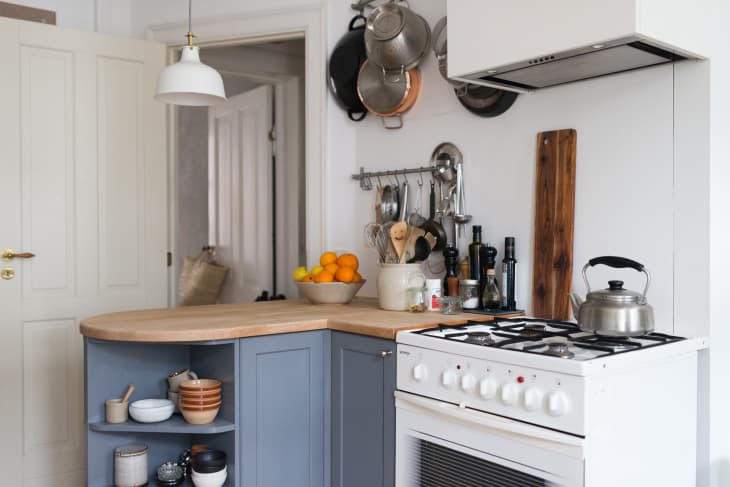This Is the Anti-Resolution I’m Using to Slow Down and Appreciate 2021

Last year appeared out of the shadows to force people to reckon with who they are, want they want, and what their values are. Many had to spend more time with themselves than ever before. Unsurprisingly, people felt compelled to make something of this time, and better themselves in one way or another. But the urge to be productive through such a tumultuous period can actually make things worse.
I know from firsthand experience: In March 2020, my university implemented remote learning, and I decided I needed to push myself further than ever before. It didn’t feel like it was enough for me to simply weather our “new normal”—I also wanted to finally achieve a 4.0 GPA, complete my senior thesis, land a job in a precarious economy, and finally live on my own. But as the end of the semester drew closer, I experienced panic attacks more frequently and barely took care of myself. At my worst, I was spending 10 hours a day on schoolwork, and eventually, I broke.
Through at-length sessions with my therapist, I came to understand that I set expectations of myself that only fuel stress and anxiety. I’ve found that putting this period into context is a necessary form of mindfulness. Not only do I deserve to let myself breathe, more importantly, I need to be my biggest advocate through whatever the coming year throws my way.
That’s why the only resolution I have for 2021 is to be easier on myself.
In other words, I don’t need to be my worst enemy or competition, nor do I have to overachieve when survival is enough. Instead, I can start to show myself the compassion I deserve.
Being kinder toward yourself is not as easy as it sounds. Negative thoughts and expectations of yourself can infiltrate your mind and evolve into a knee-jerk reaction. After my therapist suggested I try catching myself when I talk down about myself and allowing myself to consider the opposite, more positive thought, I began to notice how often I talk down to or shame myself whenever I don’t live up to my own expectations. The exercise worked almost instantly. Now, instead of dwelling on what wasn’t, I’ve begun leading my life with self-compassion, which will positively impact me in the long run.
Science has also found that being hard on ourselves doesn’t actually work as the motivator we think it is. According to Dr. Christopher Germer, developer of the Mindful Self-Compassion training program, self-critical language is often a defense mechanism that “helps us avoid the criticism of others if we attack ourselves first.”
Dr. Germer also noted that “our culture of perfectionism—the need for perfect bodies, perfect minds, perfect social skills— sows the seeds of self-loathing.” To that end, setting high expectations for ourselves and the future effectively becomes a form of self-sabotage. “Self-compassion is a direct antidote to shame,” Dr. Germer added. That may be the antidote we all need emotionally in 2021.
If the past year has taught me anything, it’s how strong I am and how much I’ve endured. When I left for spring break last March, I didn’t know when I would see my friends, roommate, or boyfriend next, nor that my childhood bedroom would become my only place of solace for the better part of a year. I barely allowed myself to look forward to what the year could be—and I used benchmarks from a bygone era, like good grades, to measure my success.
I also turned to social media as a way to both escape, and self-criticize. The more I was online, the more posts I’d see from people celebrating their wins. I began weaponizing the success of other people—and especially newly-employed graduates—as a form of self-harm, and constantly compared myself to mutuals and strangers. I kept asking myself, “What are they doing that I’m not?” Unfortunately, I’m not alone.
A 2019 study from researchers at Ryerson University in Toronto found that higher levels of social media use are associated with lower levels of self-esteem. In hopes of finding a general consensus, the researchers concluded that one of the harmful reasons why people with low self-esteem use social media at higher rates is to engage with negative social comparisons. Another takeaway? People who use more than one form of social media often exhibit lower levels of self-esteem than their peers.
In September of last year, I made the conscious choice to step away from the internet as much as possible. For the first time in months, I had no idea what was going on the pop culture zeitgeist—and surprisingly, I didn’t care. Disconnecting from the internet enabled me to recenter myself and reflect on values and goals, as well as feeling more connected to life as I knew it before the pandemic.
I know now that I don’t need to make my life harder than it has to be. I also learned that being easier on yourself often means blocking out the external world, and looking inward for happiness and validation.
You can’t control everything, but you can control how you treat yourself and how you spend your time. I will remind myself not to internalize other people’s success and instead celebrate their wins. I will keep saying positive affirmations toward myself every morning, apply to career-oriented jobs, and watch way too much reality television, but I will also try to not be so hard on myself in the process. You should, too.